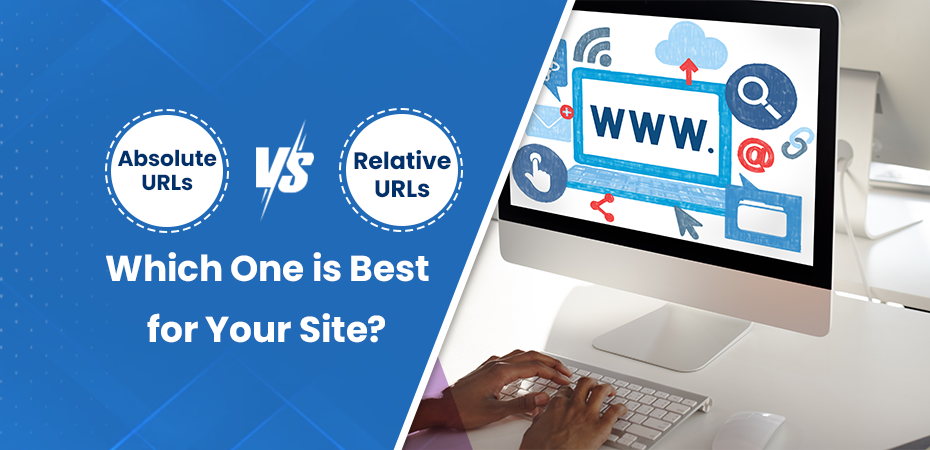Absolute vs. Relative URLs: Which One is Best for Your Site?



In the world of digital marketing, two terms that you are likely to frequently come across are “Absolute URLs” and “Relative URLs”. They are part of the critical jargon in website development and Search Engine Optimization (SEO). Although these may seem like technical jargon to the uninitiated, they play a pivotal role in your website’s performance and success on search engines.
It’s vital to fully comprehend their functionalities and influence on your website’s SEO strategy, as they can have a notable impact on your site’s user experience and search engine rankings.
This comprehensive guide will explore what Absolute URLs and Relative URLs are, their pros and cons, how they impact SEO, and help you decide which one to use for your website’s needs.
Understanding Absolute URLs and Relative URLs
A site URL means the web address that directs users to a specific page on a website, defining its location on the internet.
Absolute and Relative URLs are the two types of Uniform Resource Locators (URLs), which represent different methods for specifying the location of a webpage or other web resources on a website. When building a website or sharing a link, understanding the difference between these two types of URLs is crucial.
Absolute URLs
An Absolute URL contains all the information needed to locate a resource on the web. This usually includes the protocol (http or https), the domain name, and the specific path to the resource. Because they provide the full website address, they rely on no other information to direct users to the correct page. They are generally used when linking to websites or resources outside of the current website.
For example: https://www.example.com/shop/product
Relative URLs
On the other hand, a Relative URL is a more shortened reference to a file or page. It assumes the current base URL or Uniform Resource Locator and appends the value of the relative URL to the end. This is very efficient when working with files or pages within the same website, therefore making it easier and faster to code. Additionally, if the domain name ever changes, the links would still work as they do not rely on the domain name.
For example, if we are on the page: https://www.example.com/shop/, a relative URL to a product page might just be product
Difference Between Absolute URL and Relative URL
| Absolute URL | Relative URL |
|---|---|
| Contains full website address | Contains only the destination page’s address relative to the current page |
| Independent of website’s current location | Dependent on website’s current location |
| Used for linking to external resources | Used for linking to pages within the same website |
Choosing Between Relative URL and Absolute URL
The choice between Absolute and Relative URLs often depends on your website’s structural and organizational needs, development resources, and SEO strategies. Understanding the difference between relative and absolute URLs is key to making an informed decision.
Absolute URL contains all the information required to locate a resource, including protocol, hostname, and file path, while a Relative URL provides the path to the resource relative to the current page.
Key Points to Consider
- Structural and Organizational Needs: For large websites with multiple pages, using absolute URLs can ensure consistency and ease of navigation. However, for smaller websites or those with a less complex structure, relative URLs might suffice.
- Development Resources: Using absolute URLs can require more development resources, as any changes to the site structure will require updating all URLs. With relative URLs, changes to the site structure need less maintenance.
- SEO Strategies: While both absolute and relative URLs can be efficiently crawled and indexed by search engines, absolute URLs reduce the risk of duplicate content, often looked down upon by search engines.
Knowing the main points of relative vs. absolute URLs helps you choose the best URL structure for SEO, site performance, and user experience.
Benefits and Drawbacks of Using Absolute URLs
Absolute URLs, as opposed to relative URLs, contain the complete internet address to a specific resource. They are frequently used in web development to direct users and web crawlers to specific pages or content of a website. As with any technology, using absolute URLs comes with its own set of advantages and disadvantages.
Benefits of Absolute URLs
- Clarity and Precision: Absolute URLs are complete and provide a clear path to the resource. They eliminate any potential confusion about the resource’s exact location. This clear cut understanding can reduce the risk of accessing incorrect pages or misdirection.
- SEO Benefits: Search Engine Optimization (SEO) is an important aspect of maintaining a web presence. From an SEO perspective, absolute URLs are better than relative URLs because they reduce the likelihood of search engines getting confused and indexing the same content multiple times.
- Cross-Domain Usage: Absolute URLs can be used across different domains, meaning the same link can be used on multiple websites leading to the same location. This is especially useful for sharing links via social media or email.
Drawbacks of Absolute URLs
- Length: One significant drawback of absolute URLs is their length. They can be cumbersome to handle in large websites due to their comprehensive nature and may create an unwieldy user experience.
- Less Flexibility: In case a website undergoes structure changes or moves to another domain, it becomes a tedious task to update all the absolute URLs as they indicate the exact path, whereas relative URLs adjust to the changes more easily.
Benefits and Drawbacks of Using Relative URLs
Advantages of Relative URLs
Relative URLs, which are URLs that refer to a location relative to the current page, have several beneficial uses. They include:
- Brevity: Relative URLs are generally shorter than absolute URLs. This can make your HTML easier to read and write, and reduce the size of your web pages.
- Easy Management: If you ever move your website or change domain names, relative URLs will remain functional while absolute URLs will need to be updated. This is particularly advantageous for large websites with hundreds or even thousands of URLs.
- Uniform Resource Locators: Relative URLs also provide a degree of uniformity, which can make your website more user-friendly. According to a study, 65% of website users prefer simpler and more uniform addresses.
Drawbacks of Relative URLs
Despite their benefits, relative URLs also have some potential downsides:
- Confusion: Relative URLs can be confusing, especially for novice web developers. Their functionality depends on the current page’s URL, so the same relative URL can lead to different locations depending on where it’s used within the site.
- Inaccurate Page Access: If not handled correctly, relative URLs may lead to 404 errors or wrong page access. Web analytics firm ‘Weborama’ reported that 9.3% of all website errors are related to incorrect URLs.
- Traversal Difficulties: Navigating through directories with relative URLs can be confusing as ../ might need to be added to navigate to parent directories.
Absolute URL vs Relative URL: Impact on SEO
Absolute and Relative URLs have significant implications for your website’s SEO. For example, Absolute URLs are beneficial in preventing duplicate content issues, a factor that can negatively impact your website’s SEO ranking. Using absolute URLs means that each page on your site has one unique URL, which rules out any possibilities of duplicate content.
On the other hand, Relative URLs are easier to manage, particularly for large websites. They allow for more straightforward site maintenance and quicker load times due to their simple structure and small size.
- Absolute URLs reduce the risk of duplicate content, which can damage your SEO ranking.
- Relative URLs can improve site loading times due to their simple structure and small size, something that can indirectly boost SEO.
Wrapping Up: Relative URL vs Absolute URL – Which to Choose?
Ultimately, both Absolute and Relative URLs have their pros and cons, and it’s crucial to select the method that aligns with your SEO strategy and website development goals. A blend of both methods can also be a good approach, provided they are implemented correctly. Remember, consistency is vital, and whichever method you choose, ensure it is used consistently across your website.
| URL Type | Pros | Cons |
|---|---|---|
| Absolute URL | Prevents duplicate content, Boosts SEO | Longer in size, More complex structure |
| Relative URL | Simpler structure, Smaller in size | Risk of duplicate content, Potential SEO impact |
Whichever URL type you decide to go with, make sure to conduct regular audits to check for broken or duplicate links. This way, any potential SEO harm can be prevented or quickly rectified.
Conclusion
Choosing between the two types of URLs involves considering your website’s structure, development needs, and SEO strategies. While Absolute URLs help prevent duplicate content issues, the latter offers brevity and easy management. Real-world examples provide practical insights into their effective use. By understanding these concepts, you can make informed decisions that enhance your website’s user experience and SEO performance.
In conclusion, whether you choose to use Absolute URLs or Relative URLs ultimately depends on your website’s specific needs. Seeking the expertise of a seasoned SEO agency like SEO Expert New York can help simplify this decision and align it with your larger SEO goals.
Frequently Asked Questions (FAQs)
Absolute URLs are complete addresses that include the protocol, domain, and path to a file or page. Relative URLs, on the other hand, are shorter addresses that reference a file or page relative to the current location.
Both have their merits. Absolute URLs prevent duplicate content issues, which could harm SEO. Meanwhile, Relative URLs provide easy site management, crucial for larger websites. The choice depends on the specifics of your website and its SEO needs.
SEO Expert New York offers comprehensive SEO services backed by industry expertise. We guide businesses in selecting the most suitable strategies – such as choosing between Absolute and Relative URLs – based on their specific needs.